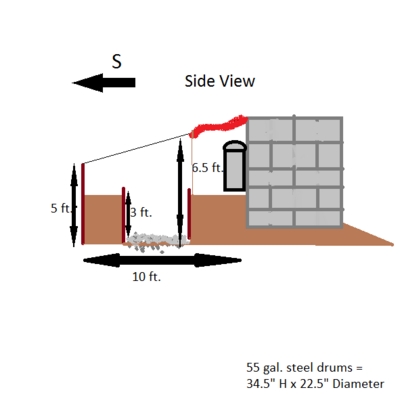




There is nothing permanent in a culture dependent on such temporaries as civilization.
www.feralfarmagroforestry.com




There is nothing permanent in a culture dependent on such temporaries as civilization.
www.feralfarmagroforestry.com




Our inability to change everything should not stop us from changing what we can.




There is nothing permanent in a culture dependent on such temporaries as civilization.
www.feralfarmagroforestry.com
 1
1









Our inability to change everything should not stop us from changing what we can.








Robert Ray wrote:At what point in time does technology versus simple living kick in?
Robert Ray wrote:Water is needed for any food production.
"the qualities of these bacteria, like the heat of the sun, electricity, or the qualities of metals, are part of the storehouse of knowledge of all men. They are manifestations of the laws of nature, free to all men and reserved exclusively to none." SCOTUS, Funk Bros. Seed Co. v. Kale Inoculant Co.





Our inability to change everything should not stop us from changing what we can.








There is nothing permanent in a culture dependent on such temporaries as civilization.
www.feralfarmagroforestry.com




Emerson White wrote:
Self sufficiency is both wasteful and impossible. Humans evolved to get along with each other, especially where trade is concerned, because the humans who didn't died out. If you want to die out then yes aim for total self sufficiency, but Adam Smith made a very solid case for specialization.





Our inability to change everything should not stop us from changing what we can.






Our inability to change everything should not stop us from changing what we can.








find religion! church
kiva! hyvä! iloinen! pikkumaatila
get stung! beehives
be hospitable! host-a-hive
be antisocial! facespace




There is nothing permanent in a culture dependent on such temporaries as civilization.
www.feralfarmagroforestry.com





Mt.goat wrote:
Enjoy The pvc glue!
find religion! church
kiva! hyvä! iloinen! pikkumaatila
get stung! beehives
be hospitable! host-a-hive
be antisocial! facespace




tel jetson wrote:
I won't claim that these will be truly sustainable structures. they are really a testament to my own weakness for foods that would be very difficult for me to grow without a greenhouse. if I were a better human, I would just give up those foods for any of the incredible selection of food that will grow easily where I live, but I'm not willing to do that. I'm greedy for the flavors I like. given that fact, I do believe that my habits will have less impact if I grow the food myself in a carefully designed greenhouse instead of paying to have it imported from far away lands.
so I guess my greenhouses are really about mitigating the negative impacts of my own bad habits. taking care in their design will mitigate the negative impacts of the greenhouses.
 1
1








Idle dreamer

 1
1




find religion! church
kiva! hyvä! iloinen! pikkumaatila
get stung! beehives
be hospitable! host-a-hive
be antisocial! facespace





Our inability to change everything should not stop us from changing what we can.
 1
1









hardly ever leave the farm- don't want to- the internet saves me a million road, air and sea miles, provides at least 25 extra lifetimes, connects to friends who can stay on the subject, and gives me access to the brightest people conscious......
http://www.gardenfarm.biz

















Brenda
Bloom where you are planted.
http://restfultrailsfoodforestgarden.blogspot.com/





Our inability to change everything should not stop us from changing what we can.




jacqueg wrote:
"you can't fool a potato or corn into paying you for a substandard product or a job done badly."
Yes, but which job is being done well? (Rose does not live in the US, so the farmers she is talking about may or may not be relevant to your contentions.)
Here in the US, you can indeed claim that US farmers do produce a lot of potatoes and corn. But whether it is done poorly or not depends on your definition. If all you are concerned about is tonnage of salable product, you are leaving out a lot of things that are also important, like soil and water conservation and toxics buildup.
Doing a job well does not mean that the job is worth doing in the first place.




paul wheaton wrote:
I just deleted a post here. I read about five words in the first sentence that were suggesting that somebody on permies.com was less than perfect and I didn't bother to read one more word before deleting it.
I would like to thank one the long time participants of these forums for clicking on "report to moderator".
This is just a reminder about "be nice": If even one word is what I think is less than kind, I will delete the whole post.




http://www.breezymeadowsorchards.com/learn/permaculture-design-course
Breezy Meadows orchard & Nursery Permaculture Design Course. Join us at our permaculture farm in the wilds of Tinmouth, VT. Hands on experience on a working farm that produces food 365 days a year.








 1
1
















 1
1





|
There is no more Flipper. Call me "Darth Fin" from now on. Or face the wrath of this tiny ad:
Permaculture Design Magazine
https://permies.com/wiki/237407/permaculture/Permaculture-Design-Magazine
|






